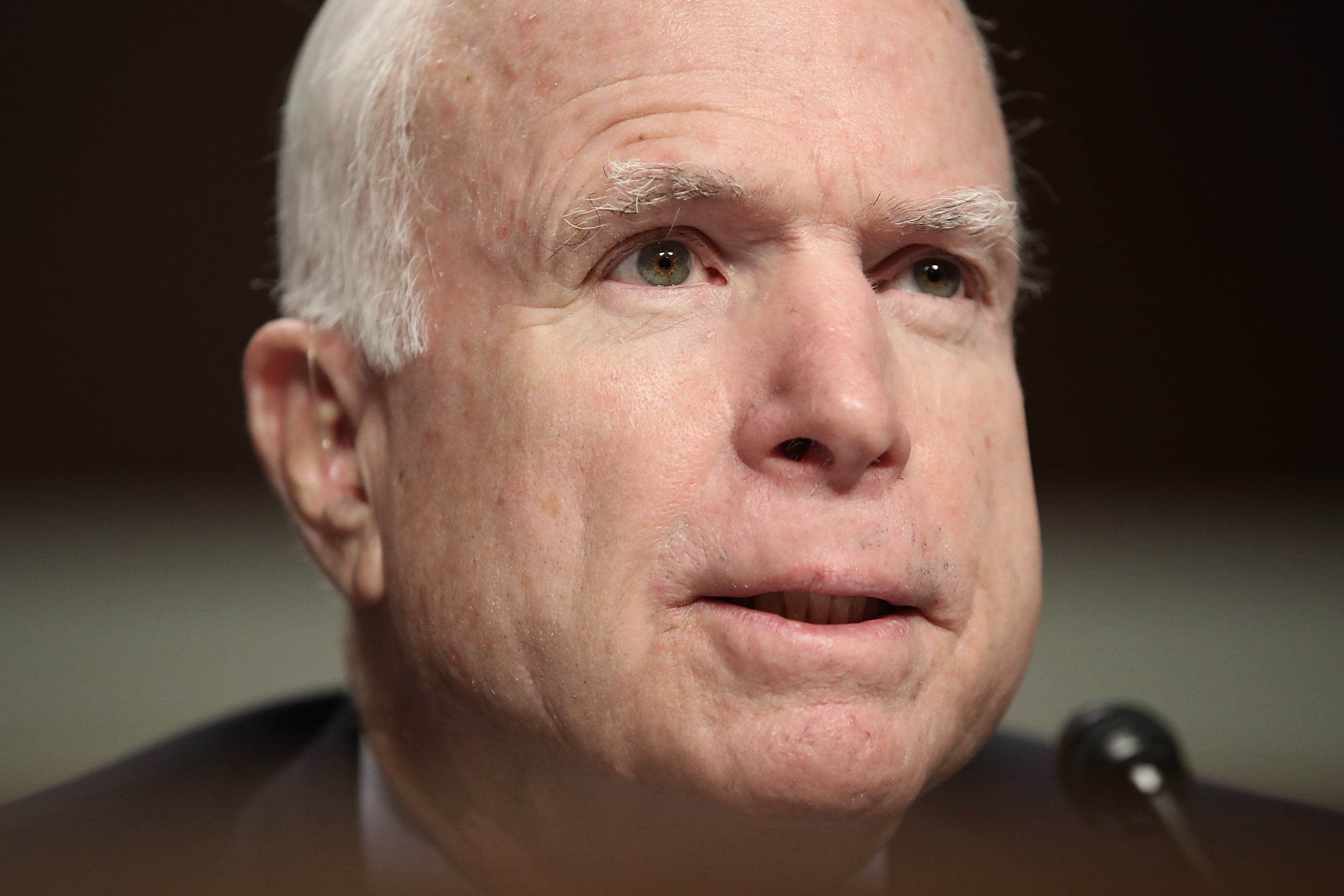WASHINGTON — The death of Senate Armed Services Committee Chairman John McCain will leave the Senate without a unique voice, one that conducted oversight of the Pentagon with forceful personality, charm and a wire-brush style of questioning.
McCain, R-Ariz., challenged the Pentagon and defense industry with taxpayers and troops in mind, calling out what he saw as problem-plagued acquisition programs and gaps or failures in U.S. national security strategy. He argued that political support for robust defense budgets is unsustainable without reigning in waste, fraud and abuse.
This week, several of his SASC colleagues said they will pick up the torch. Notably, his personal friend and fellow defense hawk, Sen. Lindsey Graham, R-S.C., told reporters Tuesday after an emotional Senate floor tribute to McCain that he had promised his dying friend weeks earlier that he would try.
“When it came to the Pentagon, he was a ferocious reformer, and he loved nothing better than getting into the bowels of the budget and finding ways, so we’re going to take that up,” Graham said. “I talked to him about a month ago, and he said: ‘Boy, you’ve got to keep it going.’ ”
McCain, who died battling brain cancer on Aug. 25, enacted numerous reforms through annual defense authorization bills, including acquisitions and sweeping bureaucratic changes. Each year, he would legislate cutbacks to programs where he saw problems and would often hold up Pentagon nominees for further scrutiny.
“John McCain was a soldier’s best friend and the Pentagon’s worst nightmare,” Graham said. “I’d like to name the Pentagon after him just to get back at everybody.”
Graham acknowledged he has sought dialogue with President Donald Trump, a departure from McCain’s more confrontational approach. Graham said he would continue to “do things the Lindsey way.”
“The worst thing I could try to do is be John McCain because I’m not,” he said. “The best thing I could do is remember what John McCain was all about and channel that into who I am.”
Graham is an Air Force veteran who served as an officer and judge advocate. He chairs the Senate Appropriations Subcommittee on State, Foreign Operations, and Related Programs, which oversees foreign aid.
Graham said he will seek help from Republican Sens. Dan Sullivan of Alaska; James Lankford of Oklahoma, and Cory Gardner of Colorado — lawmakers willing to promote American values abroad as McCain did.
Among Graham’s priorities are stiffer sanctions on Russia, protecting the midterm elections from hacking, puzzling out immigration reform and to “persuade President Trump if you leave Afghanistan, it will blow up in your face.”
Arnold Punaro, a former SASC staff director and retired two-star general, said McCain was influenced by his predecessors as chairman, particularly Texas Republican John Tower, who helped put the defense budget on an upward trajectory during the Carter administration, and Georgia Democratic Sen. Sam Nunn, whose name is synonymous with acquisition reform.
What was unique to McCain, however, was his proclivity for testiness with administration witnesses, no matter the president’s party affiliation.
“There was the phenomenon known as ‘Mount McCain’ where the volcano erupted if he thought you were giving him the runaround or parroting the administration’s position,” Punaro said. “He would press the witness, and you saw that at the beginning of this administration with a lot of the nominees.”
Punaro expressed confidence the committee would be, as it has long been, “serious, thorough and objective, particularly in civilian and military nominations.”
Several SASC members suggested no one senator will step into McCain’s shoes and that they will fulfill their oversight duties together, under the leadership of Sen. Jim Inhofe, the panel’s No. 2 Republican. Inhofe is expected to ascend to the role in the days after McCain’s funeral is complete.
“The reality is John was such a unique personality that I don’t think any one person will step in and say: ‘I’m the one doing it,’ ” said the SASC’s top Democrat, Sen. Jack Reed of Rhode Island. “I think there are enough very thoughtful members on both sides who pursue their duties very seriously, and one major one is making sure we are a check on the Pentagon — not just to be a check, but they do better work when they’re being supervised.”
Out of respect for McCain, Inhofe has rebuffed reporters asking about his possible chairmanship. However, its likely Inhofe will further empower the chairmen of the panel’s various subcommittees.
“I think the other chairmen on the other committees will step up, and I assume they will continue doing that work," said Strategic Forces Subcommittee Chair Sen. Deb Fischer, R-Neb. “Yes, we won’t have John McCain there prodding us. I think it will get done.”
Maine Independent Sen. Angus King, a senior SASC member who caucuses with Democrats, called McCain’s absence “a huge loss to the committee,” comparing him to a roving ambassador and a rock star. McCain’s contacts overseas and decades of experience set him apart, King said.
Yet, King stressed that the committee is capable and will carry on, pointing to the completion of the 2019 defense policy bill in record time in McCain’s absence.
“His energy, his passion, his knowledge, his history, his relationships are unique,” King said of McCain. “That doesn’t mean the committee’s not going to be able to do its job.”
Joe Gould was the senior Pentagon reporter for Defense News, covering the intersection of national security policy, politics and the defense industry. He had previously served as Congress reporter.





